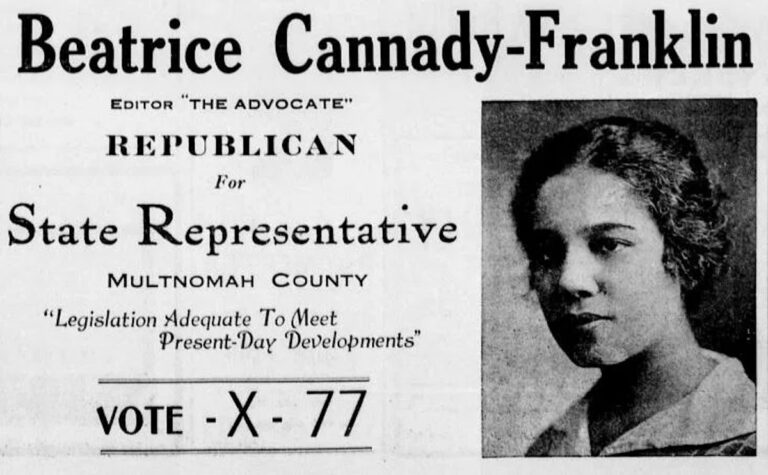Beatrice Morrow Cannady: A Powerful Writer, Attorney, and Civil Rights Leader in Oregon
This week for Black History Month, we feature the work of Beatrice Morrow Cannady, a leading civil rights activist, attorney, and journalist who stood up for racial justice and integration in Portland between 1918 and 1938. Born in 1889 in Texas, Beatrice Morrow moved to Oregon to join her to-be husband, Edward Cannady, then editor and publisher of The Advocate, a weekly newspaper that covered Black issues and advocated for changes in the midst of extreme racism in Oregon and the US.
On June 7, 1924 edition of The Advocate, Mrs. Cannady famously responded to publishers E. C. Bell and J. J. Hoogstraat of Grants Pass with a profound response to racist Oregon policies in print. The Spokesman, a short-lived publication from Grants Pass had published an editorial promoting Grants Pass and the Rogue Valley as a “white man’s town.”
Cannady republished the entire Spokesman editorial in The Advocate, which included vulgar and grotesque hate language — and bizarre affirmations of a twisted “white utopia” that they claimed was all of Southern Oregon. The courageous response by Cannady included describing the publishers sentiments as, “the child of a twisted and dwarfed brain, or the braying of a jackass.”
In addition to her writing, publishing, and co-founding of Oregon’s first NAACP chapter, Cannady ran a 15-year campaign to limit the screenings of the racist film, “A Birth of A Nation.”
In 1938, eight years after her divorce from Mr. Cannady, Beatrice moved to Southern California and continued writing, without the public notoriety but with consequence for civil rights issues in California at the time.
Some 14 years ago, an associate professor at University of Utah, Kimberly Mangun, wrote a partial biography of Beatrice Morrow titled, Beatrice Morrow Cannady and the Struggle for Civil Rights in Oregon, 1912-1936.
Oregon Public Broadcasting produced a documentary about Beatrice Morrow’s accomplishments and life, and can be found here.


